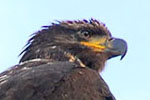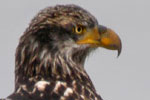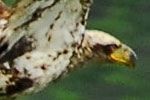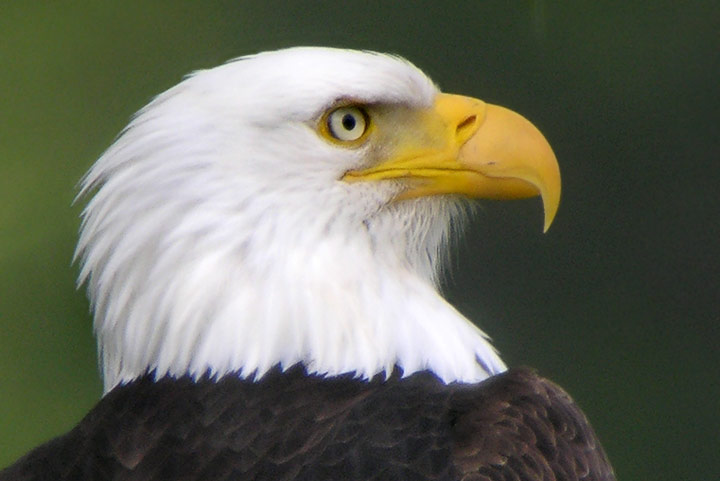Bald Eagle age
A Bald Eagle becomes sexually mature at the age of four to five years. Prior to that it undergoes substantial changes in appearance which enables its age to be estimated. All the variations can be seen around the Lake, as local eagles do not migrate.
Adult Bald Eagles mate for life. In February, they show serious breeding behaviour: they add new sticks to their existing nests and mate. By the end of March, eggs have been laid. Chicks hatch late in April. By mid-July, the young have fledged.
| Appearance of a Bald Eagle by Age | |||
|---|---|---|---|
| Age | Head | Body | Image |
| Chick in nest |
plumage: grey down ⇒ brown feathers beak, cere: blackish iris: sepia |
plumage: grey down ⇒ brown feathers | unavailable |
| Juvenile fledged ½ yr |
plumage: blackish brown crown: slight bleaching by winter beak, cere: uniformly dark grey iris: sepia |
underparts: buff brown mottled dark wing coverts: dark brown wing pits: mottled white tail: sooty black mottled white |
 |
| Basic I 1½ yr |
plumage: brown crown: tan beak, cere: mainly dark grey iris: lightens to buff–brown |
tail: brown body, wings: dark brown wing pits: mainly white mantle: mottled white triangle breast: mainly olive belly: darker than breast |
 |
| Basic II 2½ yr |
plumage: the osprey–head look crown: light grey auriculars: brown band to eye throat: extensive white beak: blackish grey, buff–yellow cere iris: light cream |
tail: smokey grey going to mottled brown at tips body, wings: brown occasionally mottled white wing pits: variable, mottled white |
 |
| Basic III 3½ yr |
plumage: striking shift to white crown: brown flecking, also around and behind eye beak, cere: mainly yellow, brown line forward of nares iris: pale yellow |
tail: white, terminal brown strip body, wings: dark brown with scalloped buff feather margins; slight white flecking on chest and wing pits |
unavailable |
| Basic IV 4½ yr |
plumage: same as III except almost no brown mottling on head | tail: white body, wings: same as III |
unavailable |
| Adult 5½ yr ⇒ |
plumage: white beak: yellow iris: pale yellow |
tail: white body, wings: dark brown with scalloped buff feather margins |
 |